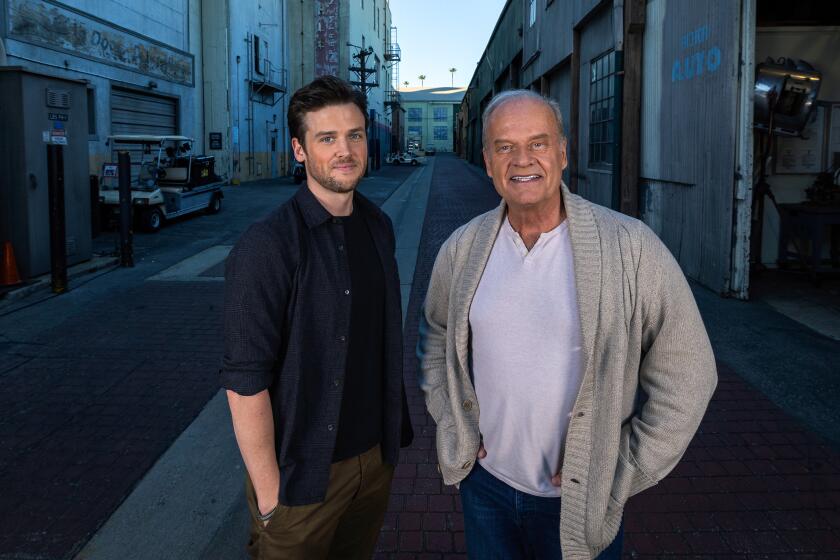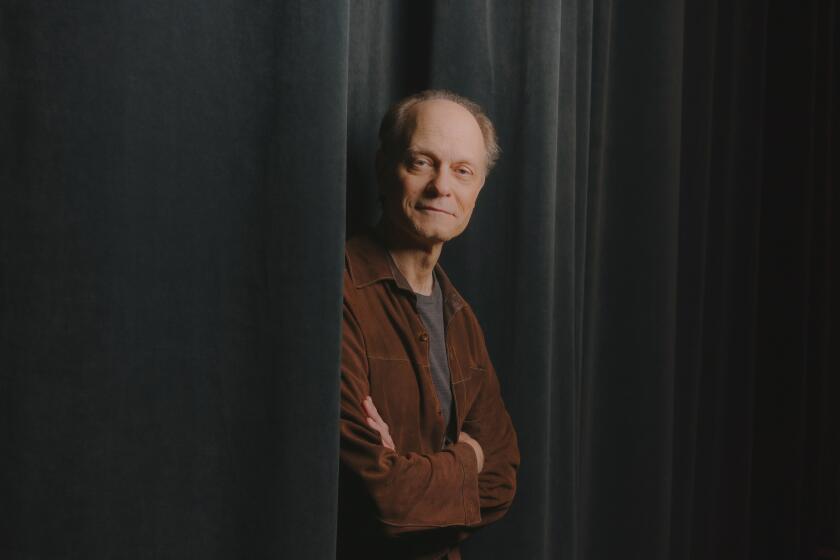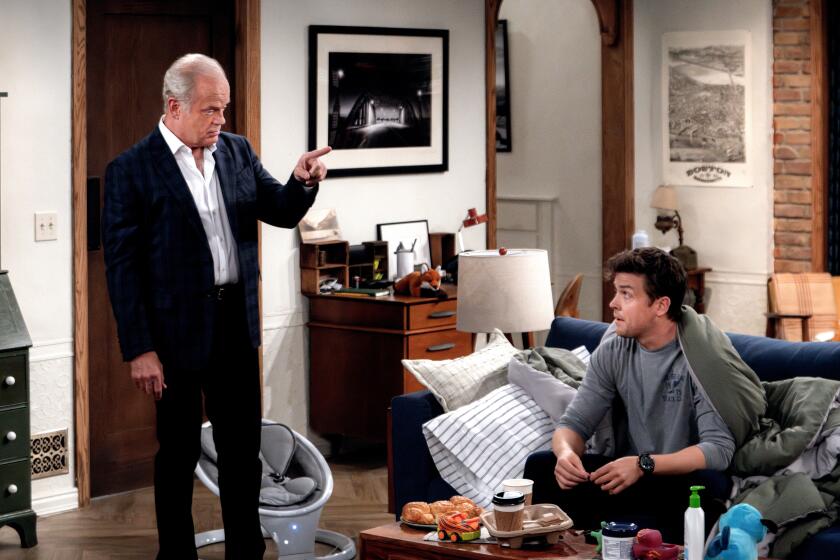‘Frasier’ is more inclusive now, but I still grapple with my love for the show
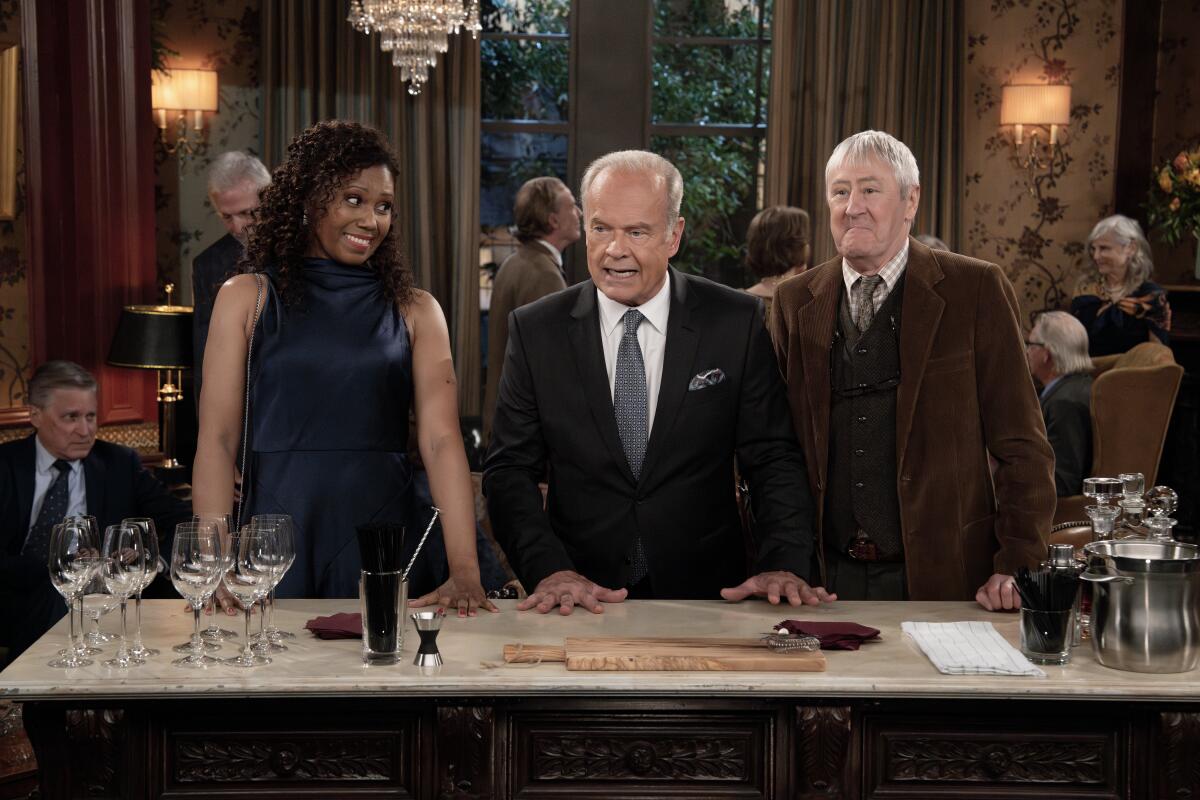
- Share via
In the new rendition of “Frasier,” which jumps 20 years into the iconic, titular character’s future, two women of color are part of the main cast. This decision isn’t revolutionary — it’s part of a larger trend to make television more representative. As a mixed-Black woman, it better melds my lived experience with the characters I have come to love.
In the original series, Frasier (Kelsey Grammer) and his brother, Niles (David Hyde Pierce), seemed to represent my own extended, tight-knit family, with their taste for opera and classical music, their love of Gilbert and Sullivan musicals and classic books. Like the Crane brothers, I was also bullied in high school and never seemed to make inroads with the “in crowd” even into adulthood, despite my efforts. And Niles in particular exemplified a sensibility I hadn’t yet seen on screen at that time, one of formality that reminded me of my uncle, who wouldn’t be caught dead in something as casual as a T-shirt.
I watched “Frasier” during its initial run, catching episodes here and there, but a few years ago, I rediscovered the series after a friend mentioned it was streaming. I’ve since binged and rewatched it multiple times. While I’ve largely enjoyed immersing myself in it again, certain aspects of the show are reminders that it doesn’t connect me to my Black culture, which, because I was raised by my white family in predominantly white neighborhoods, I’ve had to cultivate it myself. Though it’s meant for a laugh, I cringe when Niles says, “Wealthy white women just can’t get a fair shake.”
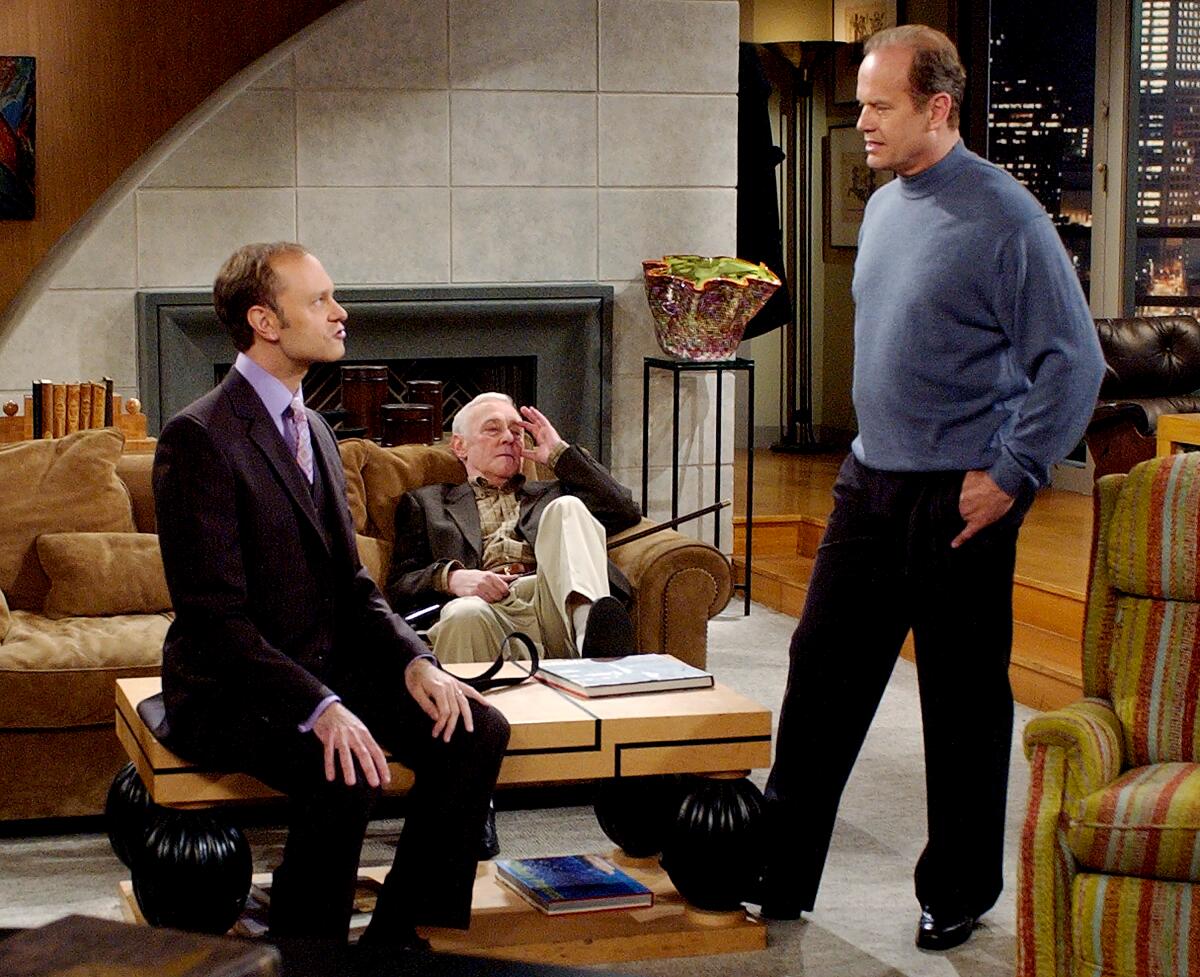
Few Black actors appear on the show, many with single lines in single scenes. In fact, its lack of diversity has been a punchline, like when Colin Jost on “Saturday Night Live’s” “Weekend Update” said, “For those of you too young to remember, ‘Frasier’ was the show that made ‘Friends’ look Black.” As I thought more about its reputation, I wondered if I was white-washing my identity by continually immersing myself in the Frasierverse.
As the first season of the “Frasier” reboot comes to a close on Paramount+, Kelsey Grammer and Jack Cutmore-Scott spoke to The Times about connecting the new series to the original; Grammer also weighed in on that BBC interview.
On “Frasier,” most Black characters were in peripheral roles like a basketball player, a nurse, a taxi driver or a man in prison. They didn’t push the status quo and weren’t part of the Cranes’ inner, elitist circle. But the three Black characters with any real arc didn’t appear until the latter half of the series. In a Season 7 episode, Frasier hires Mary Thomas, played by Kim Coles, to be a temporary call screener through a program called Second Start, only to be confronted by his own racial hang-ups. Another episode puts them together again, and this time, Mary (who now calls herself Dr. Mary much to Frasier’s chagrin) is beloved by the community in a way Frasier finds threatening. The other two meaningful characters are Cam and Cora Winston (Brian Stokes Mitchell and Emily Yancy) of Season 9: Frasier’s polished neighbor and nemesis, who appears in three episodes, and his veterinarian mother who has a fan-favorite flirtation with Frasier’s father, Martin.
David Hyde Pierce is in the cast of “Here We Are,” Stephen Sondheim’s final musical, at the Shed in New York.
Like the revival of “Gilmore Girls,” where Rory’s prep school is now diverse, Frasier’s world in the reboot is no longer mostly white. Instead of Dr. Mary, who graduated from the “school of hard knocks,” we have Olivia Finch, played by Toks Olagundoye, a Black woman who is chair of the psychology department at Harvard, and whose sister, we learn, is provost at Yale. Olivia is positioned as Frasier’s equal, likely having orbited similar spaces. In a bar scene, after Olivia makes an intellectual joke, Alan, Frasier’s (white) college roommate and now teaching chum, says to them both, “None of us dated in high school, did we?”
Olivia isn’t there as a foil to give Frasier some sort of racial awakening. Such moments can be important, but it is equally important for characters of color to exist in their own right, to take up space without enhancing the protagonist’s sensibilities. Jess Salgueiro, the Portuguese Canadian actress who plays the friend and neighbor of Frasier’s son, Freddy, looks like me, with her curly hair and olive skin, though our racial backgrounds are different. Seeing someone with my likeness on TV still feels like a novelty after decades of what feels like invisibility. If I had seen more actors like this on TV in my youth, maybe I wouldn’t have felt that my body and background set me apart from what was portrayed as the norm.
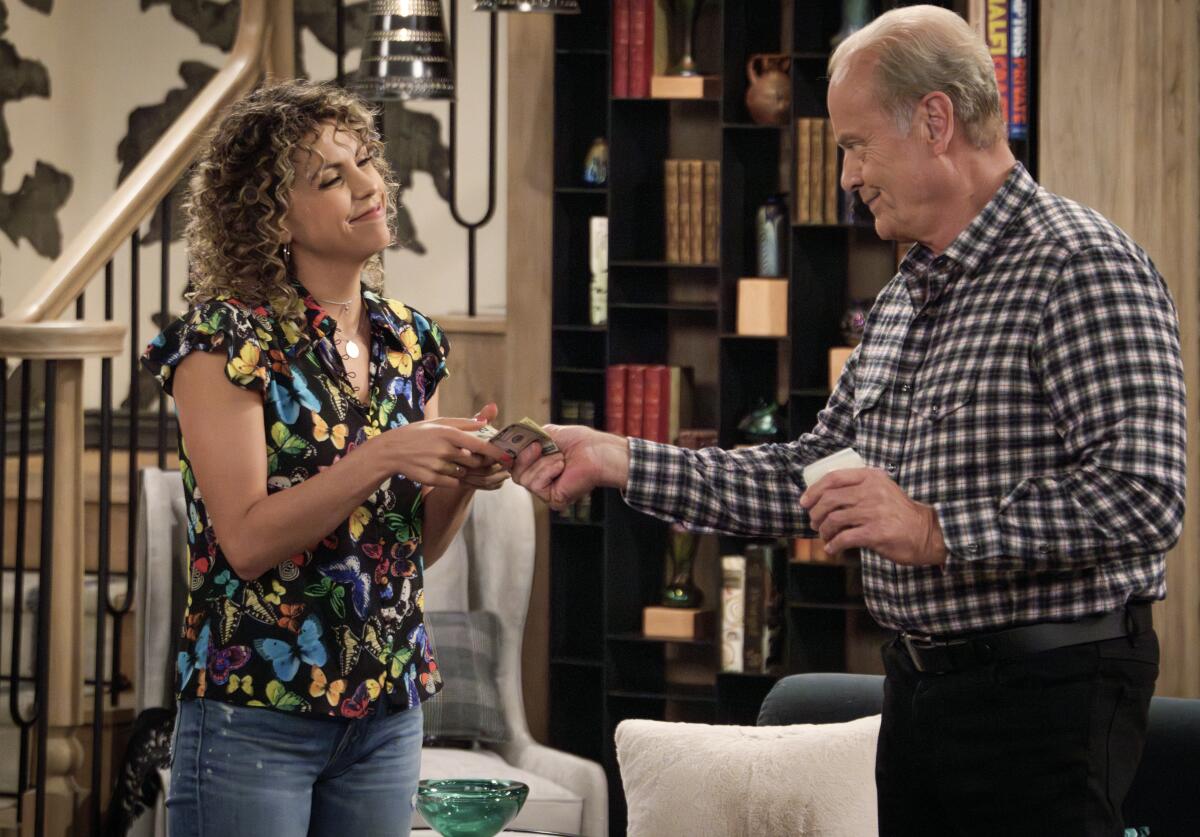
Will the Frasier reboot return for another season? That’s anyone’s guess for now, though an interview this week with the BBC may make some fans disinclined to continue watching the show. It’s no secret that Grammer is conservative, and on Monday, when asked by BBC’s Justin Webb if he’s still a supporter of former President Donald Trump, he replied, “I am. And let that be the end of it.” Though the interview abruptly ends, Webb says in the segment that the publicists for Paramount cut it short and that Grammer was happy to keep discussing Trump.
Joe Cristalli and Chris Harris wanted the reboot of the iconic series to focus on a new chapter for its lead character, Frasier Crane, by focusing on his relationship with his son, Freddy.
It’s not the first time I’ve wrestled with loving this show when Grammer takes such an opposite stance from my own political views. But Frasier and Niles are painted as liberals in the series, and the “Frasier” reboot isn’t just about Grammer. Some viewers might be inclined to boycott it, but that would be also mean boycotting actors like Salgueiro and Olagundoye.
In my favorite Facebook group, the official Frasier Fan Club, the admins ban any mention of politics or religion. It’s one virtual space where our connection to something beyond the real world bonds us. Every post must connect to “Frasier”; our copied and self-generated memes provide us comic relief from (unpolitical) world events to pop culture references. When people like me are dealing with generational trauma, police brutality, Supreme Court reversals, and everyday microaggressions, this fictional universe is a constant source of comfort, with characters that make the world a little less scary.
If “Frasier” is picked up for another season, I hope Olivia and Eve can play a more central role in the show. For much of the season, we’ve learned little more about Eve other than her firefighter boyfriend died on duty, leaving her alone with their son, and that Olivia wants to outdo her sister and that she’s a “Craniac.” In the last episode of the season, their characters finally begin to develop: Eve is sad about spending her first Christmas alone since her boyfriend’s passing, and Olivia has a magical moment with one of the firefighters in Freddy’s unit. These evolutions are a step in the right direction; while increasing representation is important, that representation can only make a limited impact when the characters are merely there to buoy the rest of the cast.
Shannon Luders-Manuel is the author of the forthcoming memoir “Black Prince: A Father-Daughter Story in Black and White,” by Lawrence Hill Books / Chicago Review Press. She has been published in The New York Times, LA Review of Books, and JSTOR Daily, among others. She resides in Los Angeles.
More to Read
The complete guide to home viewing
Get Screen Gab for everything about the TV shows and streaming movies everyone’s talking about.
You may occasionally receive promotional content from the Los Angeles Times.
